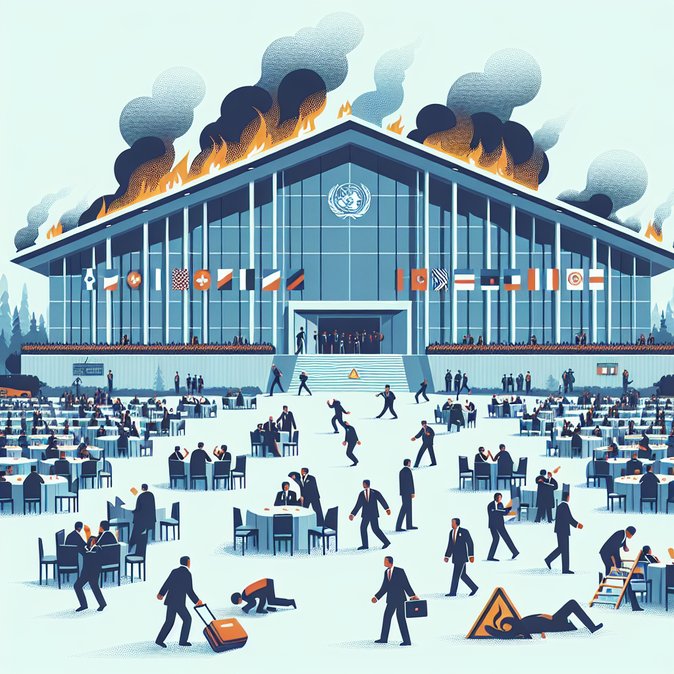
A sudden blaze tore through a cluster of national pavilions inside Belém’s Hangar Convention Center at about 09:45 a.m. local time on 20 November, forcing organisers to trigger a full-scale evacuation of the United-Nations-run Blue Zone of COP30. Eyewitness video showed flames and billowing smoke near the China Pavilion before alarms sent negotiators, observers and press rushing to muster points. Pará state fire-fighters contained the blaze within 30 minutes, but inspectors ordered an immediate shutdown while they assessed structural damage and electrical safety.
Although no injuries were reported, the interruption could not have come at a worse moment for nearly 32,000 accredited participants. Delegations were in the final stretch of negotiations on a landmark package covering fossil-fuel phase-out language and a scaled-up climate-finance goal. With the conference already running behind schedule, officials now face the prospect of relocating negotiations to back-up halls or extending talks into the weekend—moves that would complicate flight and hotel arrangements for hundreds of corporate and NGO observers.
![Fire Forces Full Evacuation of COP30 Venue in Belém, Disrupting Thousands of Delegates]()
The incident highlights long-standing worries over Belém’s readiness to host the world’s largest diplomatic gathering. In the weeks leading up to COP30, business-travel risk consultancies flagged unfinished construction, scarce hotel rooms and limited medical capacity as latent threats to duty-of-care compliance. Thursday’s fire will likely intensify scrutiny of Brazil’s event-safety standards and could spur companies to review contingency plans such as remote participation or split-site delegations.
Practically, mobility managers should prepare for rescheduled sessions outside official hours, potential curfews in the security perimeter and heavier-than-usual traffic if shuttle timetables are compressed. Carriers have warned that last-minute itinerary changes may incur fare differences even when change-fee waivers apply. Travellers are advised to keep boarding passes, accreditation badges and passports on hand in case perimeter screening tightens when the venue re-opens.
While UN officials expressed confidence that COP30 can still conclude successfully, the episode underscores the need for robust crisis-management strategies at mega-events. Companies with staff on site should re-verify emergency-notification trees, reconfirm hotel fire-safety features and remind delegates to register with their travel-risk platforms in case further disruptions arise.
Although no injuries were reported, the interruption could not have come at a worse moment for nearly 32,000 accredited participants. Delegations were in the final stretch of negotiations on a landmark package covering fossil-fuel phase-out language and a scaled-up climate-finance goal. With the conference already running behind schedule, officials now face the prospect of relocating negotiations to back-up halls or extending talks into the weekend—moves that would complicate flight and hotel arrangements for hundreds of corporate and NGO observers.

The incident highlights long-standing worries over Belém’s readiness to host the world’s largest diplomatic gathering. In the weeks leading up to COP30, business-travel risk consultancies flagged unfinished construction, scarce hotel rooms and limited medical capacity as latent threats to duty-of-care compliance. Thursday’s fire will likely intensify scrutiny of Brazil’s event-safety standards and could spur companies to review contingency plans such as remote participation or split-site delegations.
Practically, mobility managers should prepare for rescheduled sessions outside official hours, potential curfews in the security perimeter and heavier-than-usual traffic if shuttle timetables are compressed. Carriers have warned that last-minute itinerary changes may incur fare differences even when change-fee waivers apply. Travellers are advised to keep boarding passes, accreditation badges and passports on hand in case perimeter screening tightens when the venue re-opens.
While UN officials expressed confidence that COP30 can still conclude successfully, the episode underscores the need for robust crisis-management strategies at mega-events. Companies with staff on site should re-verify emergency-notification trees, reconfirm hotel fire-safety features and remind delegates to register with their travel-risk platforms in case further disruptions arise.


